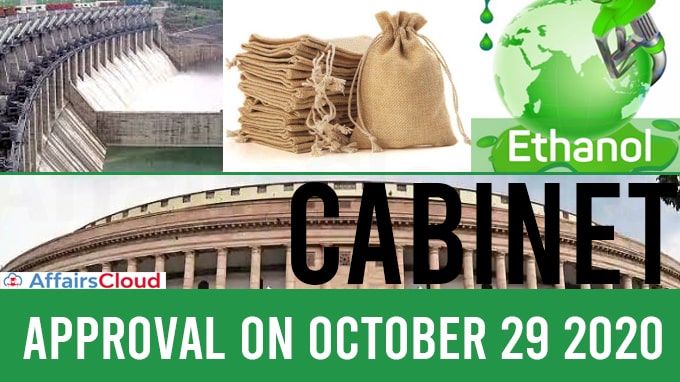 On October 29, 2020, the Union Cabinet chaired by Prime Minister Narendra Modi has approved the following proposals which were detailed by Union Minister Prakash Keshav Javadekar, Ministry of Information and Broadcasting during a press conference.
On October 29, 2020, the Union Cabinet chaired by Prime Minister Narendra Modi has approved the following proposals which were detailed by Union Minister Prakash Keshav Javadekar, Ministry of Information and Broadcasting during a press conference.
-Cabinet approves Externally Aided Dam Rehabilitation and Improvement Project – Phase II and Phase III
The Cabinet Committee on Economic Affairs (CCEA) has approved Rs 10,211 crore Dam Rehabilitation and Improvement Project (DRIP) Phase II & Phase III with the external financial assistance Rs 7,000 crore from the World Bank (WB), and Asian Infrastructure Investment Bank (AIIB).
- The project envisages improving the safety and operational performance of selected dams across the participating states as well as at central level, along with institutional strengthening with a system wide management approach.
- There will be comprehensive rehabilitation of 736 existing dams located across the country. The maximum number of dams to be taken up for rehabilitation are in Rajasthan (189) followed by Maharashtra (167) and Tamil Nadu (59).
Key Points about Project:
–It will be implemented over a period of 10 years duration in two Phases i.e. from April, 2021 to March, 2031.
–Apart of external funding of Rs 7,000 crore, the balance of Rs 3,211 crore will be borne by the concerned Implementing Agencies (IAs).
- The contribution of Central Government is Rs 1,024 crore as loan liability and Rs 285 crore as counter-part funding for Central Component.
About Asian Infrastructure Investment Bank (AIIB):
Establishment– January 2016
President– Jin Liqun
Headquarters– Beijing, China
Members– 103 Nations
About World Bank (WB):
Establishment- 1944
President– David Robert Malpass
Headquarters– Washington, D.C., United States (US)
Members– 189 Countries
-Cabinet approves Extension of Norms for Mandatory Packaging in Jute Materials
The CCEA has approved the extension of norms for mandatory packaging in Jute materials under the Jute Packaging Material (JPM) Act, 1987. In this regard, 100% of the foodgrains and 20% of the sugar shall be mandatorily packed in diversified jute bags.
- This decision has been taken to boost the jute industry as nearly 3.7 lakh workers and several lakh farm families are dependent for their livelihood on the jute sectors.
- Also, the jute industry is mostly dependent on the Government sector which purchases jute bags of value of more than Rs. 7,500 crore every year for packing foodgrains.
Points to be noted:
–This extension will benefit farmers and workers located in the Eastern and North Eastern regions of the country particularly in the states of West Bengal, Bihar, Odisha, Assam, Andhra Pradesh (AP), Meghalaya and Tripura.
–In case of any shortage in supply of jute packaging material or in other contingency, the Ministry of Textiles in consultation with the user Ministries concerned, relax these provisions further, up to a maximum of 30% of the production of foodgrains over and above the provisions.
Other Support to Jute Industry:
–Government has been supporting approximately 2 lakh jute farmers by disseminating improved agronomic practices through Jute ICARE intervention.
–The Jute Corporation of India signed Memorandum of Understanding (MoU) with National Seeds Corporation for distribution of 10,000 quintals of certified seeds on commercial basis also.
–The National Jute Board (NJB) has collaborated with National Institute of Design (NID) and a Jute Design Cell has been opened at Gandhinagar.
–Government of India has imposed Definitive Anti-Dumping Duty on import of jute goods from Bangladesh and Nepal with effect from 5th January, 2017 with a view to boost demand in the jute sector.
-Cabinet approves Mechanism for procurement of ethanol by Public Sector OMCs under EBP Programme
The CCEA approved Mechanism for procurement of ethanol by Public Sector Oil Marketing Companies (OMCs) under Ethanol Blended Petrol Programme (EBP) .This led to the following changes:
- The price of ethanol from C heavy molasses route be increased from Rs.43.75 per lit to Rs.45.69 per litre
- The price of ethanol from B heavy molasses route be increased from Rs.54.27 per lit to Rs.57.61 per litre,
- The price of ethanol from sugarcane juice / sugar / sugar syrup route be increased from Rs.59.48 per lit to Rs.62.65 per litre,
- Additionally, GST and transportation charges will also be payable.
- OMCs have been advised to fix realistic transportation charges so that long distance transportation of ethanol is not disincentivised.
Points to be noted:
–Government has been implementing EBP Programme w.e.f. April 1, 2019 pan Indian except Union Territories (UTs) of Andaman Nicobar and Lakshadweep islands wherein OMCs sell petrol blended with ethanol up to 10%. It aims to promote the use of alternative and environment friendly fuels.
–The “Ethanol Procurement Policy on a long term basis under EBP Programme” has been published by the Ministry of Petroleum and Natural Gas (MoP&NG).
Recent Related News:
i.The Central Government has approved the proposal for leasing out three airports namely Jaipur, Guwahati and Thiruvananthapuram airports of Airports Authority of India (AAI) under Public Private Partnership (PPP) to Adani Enterprises Ltd. for Operation, Management and Development.
ii.The CCEA has approved a one-time relaxation to Power Finance Corporation (PFC) and Rural Electrification Corporation (REC) for extending loans to Distribution Companies (DISCOMs) above limits of working capital cap of 25% of 2019’s revenues under Ujwal DISCOM Assurance Yojana (UDAY) amid COVID-19.




